- Home
- Arthur Miller
Collected Essays Page 15
Collected Essays Read online
Page 15
I doubt whether anybody can widen horizons by making a speech. It is possible, perhaps, by writing a play. Still, I may be able to suggest an approach to our theater which—even if it is not valid for everyone—will not be quite the same as that of the various critics; and if nothing else is accomplished here maybe it will at least appear that there is another way of looking at drama.
Tolstoy wrote a book called What Is Art? The substance of it is that almost all the novels, plays, operas, and paintings were not art but vanity, and that the rhythm with which a Russian peasant swung a scythe was more artful than all the dance on Moscow stages, and the paintings of peasants on the sides of their wagons more genuine than all the paintings in the museums. The thing that disheartened him most, I believe, was that inevitably artistic creation became a profession, and the artist who may have originated as a natural quickly became self-conscious and exploited his own gifts for money, prestige, or just for want of an honest profession.
Yet, Tolstoy went on writing. The truth, I suppose, is that soon or late we are doomed to know what we are doing, and we may as well accept it as a fact when it comes. But the self-knowledge of professionalism develops only as a result of having repeated the same themes in different plays. And for a whole theater the time for self-appraisal comes in the same way. We are, I believe, at the end of a period. Certain things have been repeated sufficiently for one to speak of limitations which have to be recognized if our theater is not to become absurd, repetitious, and decayed.
Now one can no sooner speak of limitations than the question of standards arises. What seems like a limitation to one man may be an area as wide as the world to another. My standard, my viewpoint, whether it appears arbitrary, or true and inevitable, did not spring out of my head unshaped by any outside force. I began writing plays in the midst of what Allan Seager, an English teacher friend of mine at Michigan, calls one of the two genuinely national catastrophes in American history—the Great Depression of the thirties. The other was the Civil War. It is almost bad manners to talk about depression these days, but through no fault or effort of mine it was the ground upon which I learned to stand.
There are a thousand things to say about that time but maybe one will be evocative enough. Until 1929 I thought things were pretty solid. Specifically, I thought—like most Americans—that somebody was in charge. I didn’t know exactly who it was, but it was probably a businessman, and he was a realist, a no-nonsense fellow, practical, honest, responsible. In 1929 he jumped out of the window. It was bewildering. His banks closed and refused to open again, and I had twelve dollars in one of them. More precisely, I happened to have withdrawn my twelve dollars to buy a racing bike a friend of mine was bored with, and the next day the Bank of the United States closed. I rode by and saw the crowds of people standing at the brass gates. Their money was inside! And they couldn’t get it. And they would never get it. As for me, I felt I had the thing licked.
But about a week later I went into the house to get a glass of milk and when I came out my bike was gone. Stolen. It must have taught me a lesson. Nobody could escape that disaster.
I did not read many books in those days. The depression was my book. Years later I could put together what in those days were only feelings, sensations, impressions. There was the sense that everything had dried up. Some plague of invisible grasshoppers was eating money before you could get your hands on it. You had to be a Ph. D. to get a job in Macy’s. Lawyers were selling ties. Everybody was trying to sell something to everybody else. A past president of the Stock Exchange was sent to jail for misappropriating trust funds. They were looking for runaway financiers all over Europe and South America. Practically everything that had been said and done up to 1929 turned out to be a fake. It turns out that there had never been anybody in charge.
What the time gave me, I think now, was a sense of an invisible world. A reality had been secretly accumulating its climax according to its hidden laws to explode illusion at the proper time. In that sense 1929 was our Greek year. The gods had spoken, the gods, whose wisdom had been set aside or distorted by a civilization that was to go onward and upward on speculation, gambling, graft, and the dog eating the dog. Before the crash I thought “Society” meant the rich people in the Social Register. After the crash it meant the constant visits of strange men who knocked on our door pleading for a chance to wash the windows, and some of them fainted on the back porch from hunger. In Brooklyn, New York. In the light of weekday afternoons.
I read books after I was seventeen, but already, for good or ill, I was not patient with every kind of literature. I did not believe, even then, that you could tell about a man without telling about the world he was living in, what he did for a living, what he was like not only at home or in bed but on the job. I remember now reading novels and wondering, What do these people do for a living? When do they work? I remember asking the same questions about the few plays I saw. The hidden laws of fate lurked not only in the characters of people, but equally if not more imperiously in the world beyond the family parlor. Out there were the big gods, the ones whose disfavor could turn a proud and prosperous and dignified man into a frightened shell of a man whatever he thought of himself, and whatever he decided or didn’t decide to do.
So that by force of circumstance I came early and unawares to be fascinated by sheer process itself. How things connected. How the native personality of a man was changed by his world, and the harder question, how he could in turn change his world. It was not academic. It was not even a literary or a dramatic question at first. It was the practical problem of what to believe in order to proceed with life. For instance, should one admire success—for there were sucessful people even then. Or should one always see through it as an illusion which only existed to be blown up, and its owner destroyed and humiliated? Was success immoral?—when everybody else in the neighborhood not only had no Buick but no breakfast? What to believe?
An adolescent must feel he is on the side of justice. That is how human indignation is constantly renewed. But how hard it was to feel justly, let alone to think justly. There were people in the neighborhood saying that it had all happened because the workers had not gotten paid enough to buy what they had produced, and that the solution was to have Socialism, which would not steal their wages any more the way the bosses did and brought on this depression. It was a wonderful thought with which I nearly drove my grandfather crazy. The trouble with it was that he and my father and most of the men I loved would have to be destroyed.
Enough of that. I am getting at only one thought. You can’t understand anything unless you understand its relations to its context. It was necessary to feel beyond the edges of things. That much, for good or ill, the Great Depression taught me. It made me impatient with anything, including art, which pretends that it can exist for its own sake and still be of any prophetic importance. A thing becomes beautiful to me as it becomes internally and externally organic. It becomes beautiful because it promises to remove some of my helplessness before the chaos of experience. I think one of the reasons I became a playwright was that in dramatic form everything must be openly organic, deeply organized, articulated from a living center. I used long ago to keep a book in which I would talk to myself. One of the aphorisms I wrote was, “The structure of a play is always the story of how the birds came home to roost.” The hidden will be unveiled; the inner laws of reality will announce themselves; I was defining my impression of 1929 as well as dramatic structure.
• • •
When I was still in high school and ignorant, a book came into my hands, God knows how, The Brothers Karamazov. It must have been too rainy that day to play ball. I began reading it, thinking it was a detective story. I have always blessed Dostoevsky for writing in a way that any fool could understand. The book, of course, has no connection with the depression. Yet it became closer, more intimate to me, despite the Russian names, than the papers I read every day. I never thought to ask why, the
n. I think now it was because of the father and son conflict, but something more. It is always probing beyond its particular scenes and characters for the hidden laws, for the place where the gods ruminate and decide, for the rock upon which one may stand without illusion, a free man. Yet the characters appear liberated from any systematic causation.
The same yearning I felt all day for some connection with a hidden logic was the yearning in this book. It gave me no answers but it showed that I was not the only one who was full of this kind of questioning, for I did not believe—and could not after 1929—in the reality I saw with my eyes. There was an invisible world of cause and effect, mysterious, full of surprises, implacable in its course. The book said to me:
“There is a hidden order in the world. There is only one reason to live. It is to discover its nature. The good are those who do this. The evil say that there is nothing beyond the face of the world, the surface of reality. Man will only find peace when he learns to live humanly, in conformity to those laws which decree his human nature.”
Only slightly less ignorant, I read Ibsen in college. Later I heard that I had been reading problem plays. I didn’t know what that meant. I was told they were about social problems, like the inequality of women. The women I knew about had not been even slightly unequal; I saw no such problem in A Doll’s House. I connected with Ibsen not because he wrote about problems, but because he was illuminating process. Nothing in his plays exists for itself, not a smart line, not a gesture that can be isolated. It was breath-taking.
From his work—read again and again with new wonders cropping up each time—as well as through Dostoevsky’s, I came to an idea of what a writer was supposed to be. These two issued the license, so to speak, the only legitimate one I could conceive, for presuming to write at all. One had the right to write because other people needed news of the inner world, and if they went too long without such news they would go mad with the chaos of their lives. With the greatest of presumption I conceived that the great writer was the destroyer of chaos, a man privy to the councils of the hidden gods who administer the hidden laws that bind us all and destroy us if we do not know them. And chaos, for one thing, was life lived oblivious of history.
As time went on, a lot of time, it became clear to me that I was not only reporting to others but to myself first and foremost. I wrote not only to find a way into the world but to hold it away from me so that sheer, senseless events would not devour me.
I read the Greeks and the German Expressionists at the same time and quite by accident. I was struck by the similarity of their dramatic means in one respect—they are designed to present the hidden forces, not the characteristics of the human beings playing out those forces on the stage. I was told that the plays of Aeschylus must be read primarily on a religious level, that they are only lay dramas to us now because we no longer believe. I could not understand this because one did not have to be religious to see in our own disaster the black outlines of a fate that was not human, nor of the heavens either, but something in between. Like the howling of a mob, for instance, which is not a human sound but is nevertheless composed of human voices combining until a metaphysical force of sound is created.
I read O’Neill in those days as I read everything else—looking to see how meaning was achieved. He said something in a press conference which in the context of those years seemed to be a challenge to the social preoccupations of the thirties. He said, “I am not interested in the relations of man to man, but of man to God.” I thought that very reactionary. Until, after repeated and repeated forays into one play of my own after another, I understood that he meant what I meant, not ideologically but dramatically speaking. I too had a religion, however unwilling I was to be so backward. A religion with no gods but with godlike powers. The powers of economic crisis and political imperatives which had twisted, torn, eroded, and marked everything and everyone I laid eyes on.
I read for a year in economics, discovered my professors dispensing their prejudices which were no better founded than my own; worse yet, an economics that could measure the giant’s footsteps but could not look into his eyes.
I read for a year in history, and lost my last illusion on a certain afternoon at two-thirty. In a lecture class a student at question time rose to ask the professor if he thought Hitler would invade Austria. For fifteen minutes the professor, by no means a closet historian but a man of liberal and human interests, proved why it was impossible for Hitler to invade Austria. It seems there were treaties forbidding this which went back to the Congress of Vienna, side agreements older than that, codicils, memoranda, guarantees—and to make a long story short, when we got out at three o’clock there was an extra being hawked. Hitler had invaded Austria. I gave up history. I knew damned well Hitler was going to invade Austria.
In that sense it was a good time to be growing up because nobody else knew anything either. All the rules were nothing but continuations of older rules. The old plays create new plays, and the old histories create new histories. The best you could say of the academic disciplines was that they were breathlessly running after the world. It is when life creates a new play that the theater moves its limbs and wakens from its mesmerized fixation on ordinary reality; when the present is caught and made historic.
I began by speaking of standards. I have labored the point long enough to state it openly. My standard is, to be sure, derived from my life in the thirties, but I believe that it is as old as the drama itself and was merely articulated to me in the accent of the thirties. I ask of a play, first, the dramatic question, the carpenter-builder’s question—What is its ultimate force? How can that force be released? Second, the human question—What is its ultimate relevancy to the survival of the race?
Before proceeding with these two queries I want to jump ahead to say that my object remains to throw some light on our dramatic situation today, the challenge, so to speak, which I think lies before us. I will pause for a moment or two in order to say a few things about a writer who has been, along with Ibsen, an enormous influence upon our theater whether we know it or not.
It is hard to imagine any playwright reading Chekhov without envying one quality of his plays. It is his balance. In this, I think he is closer to Shakespeare than any dramatist I know. There is less distortion by the exigencies of the telescoping of time in the theater, there is less stacking of the cards, there is less fear of the ridiculous, there is less fear of the heroic. His touch is tender, his eye is warm, so warm that the Chekhovian legend in our theater has become that of an almost sentimental man and writer whose plays are elegies, postcripts to a dying age. In passing, it must be said that he was not the only Russian writer who seemed to be dealing with all his characters as though he were related to them. It is a quality not of Chekhov alone but of much Russian literature, and I mention it both to relate him to this mood and to separate him from it.
Chekhov is important to us because he has been used as a club against two opposing views of drama. Sometimes he seems—as he evidently does to Walter Kerr—to have encouraged dramatists to an overly emphasized introspection if not self-pity. To this kind of viewpoint, he is the playwright of inaction, of perverse self-analysis, of the dark blue mood. In the thirties he was condemned by many on the Left as lacking in militancy, and he was confused with the people he was writing about.
His plays, I think, will endure, but in one sense he is as useless as a model as the frock coat and the horse and carriage. Our civilization is immeasurably more strident than his and to try to recreate his mood would be to distort our own. But more important, I think, is that—whatever the miseries of his characters—their careers are played out against a tradition of which they are quite conscious, a tradition whose destruction is regarded by them as the setting of their woes. Whether or not it was ever objectively true is beside the point, of course; the point is that they can look back to a time when the coachman was young and happy to be a coachman, when there was a larg
e, firmly entrenched family evenly maturing over the slow-passing years, when, in a word, there was an order dominated by human relations. Now—to put it much more briefly than its complexity warrants—the Cherry Orchard is cut down by a real estate man, who, nice fellow that he may be, simply has to clear land for a development.
The closest we have ever gotten to this kind of relation to a tradition is in Tennessee Williams, when a disorganized refugee from a plantation arrives in our civilization some eighty years after the plantation itself has been destroyed. We cannot reproduce Chekhov if only because we are long past the time when we believe in the primacy of human relations over economic necessity. We have given up what was still in his time a live struggle. We believe—or at least take it completely for granted—that wherever there is a conflict between human relations and necessity, the outcome is not only inevitable but even progressive when necessity wins, as it evidently must.
The main point I would make here in relation to our theater, however, is that while Chekhov’s psychological insight is given full play, and while his greatest interest is overwhelmingly in the spiritual life of his characters, his farthest vision does not end with their individual psychology. Here is a speech to remind you—and it is only one of a great many which do not at all fit with the conventional characterization of these allegedly wispy plays—concerned with nothing more than realistic character drawing and introspection. In Three Sisters Vershinin speaks:
What else am I to say to you at parting? What am I to theorize about? (Laughs) Life is hard. It seems to many of us blank and hopeless; but yet we must admit that it goes on getting clearer and easier, and it looks as though the time were not far off when it will be full of happiness. (Looks at his watch.) It’s time for me to go! In old days men were absorbed in wars, filling all their existence with marches, raids, victories, but now all that is a thing of the past, leaving behind it a great void which there is so far nothing to fill; humanity is searching for it passionately, and of course will find it. Ah, if only it could be quickly. If, don’t you know, industry were united with culture and culture with industry. . . . (Looks at his watch.) But, I say, it’s time for me to go. . . .

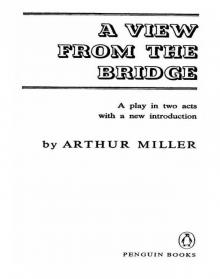 A View From the Bridge: A Play in Two Acts
A View From the Bridge: A Play in Two Acts Broken Glass
Broken Glass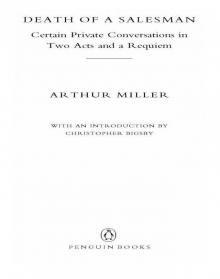 Death of a Salesman
Death of a Salesman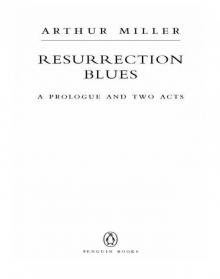 Resurrection Blues
Resurrection Blues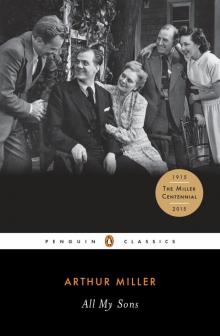 All My Sons
All My Sons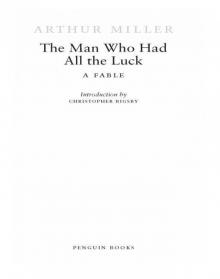 The Man Who Had All the Luck
The Man Who Had All the Luck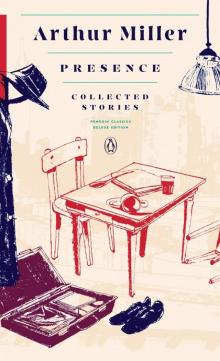 Presence: Stories
Presence: Stories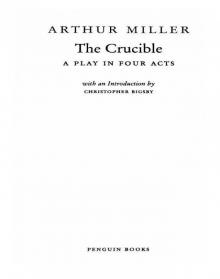 The Crucible
The Crucible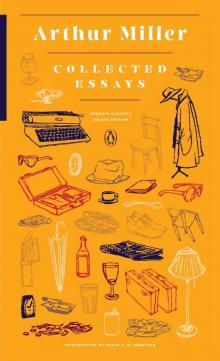 Collected Essays
Collected Essays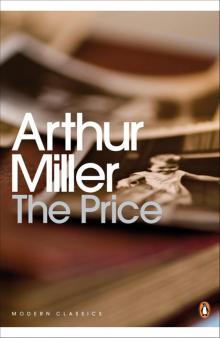 The Price
The Price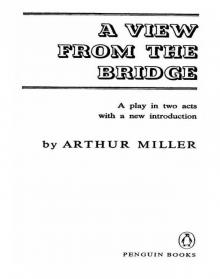 A View from the Bridge
A View from the Bridge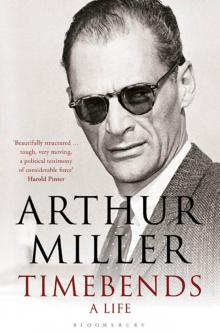 Timebends
Timebends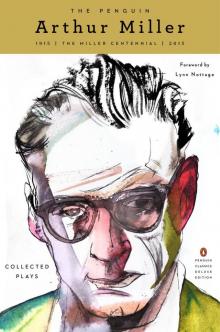 The Penguin Arthur Miller
The Penguin Arthur Miller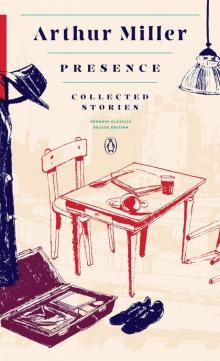 Presence
Presence